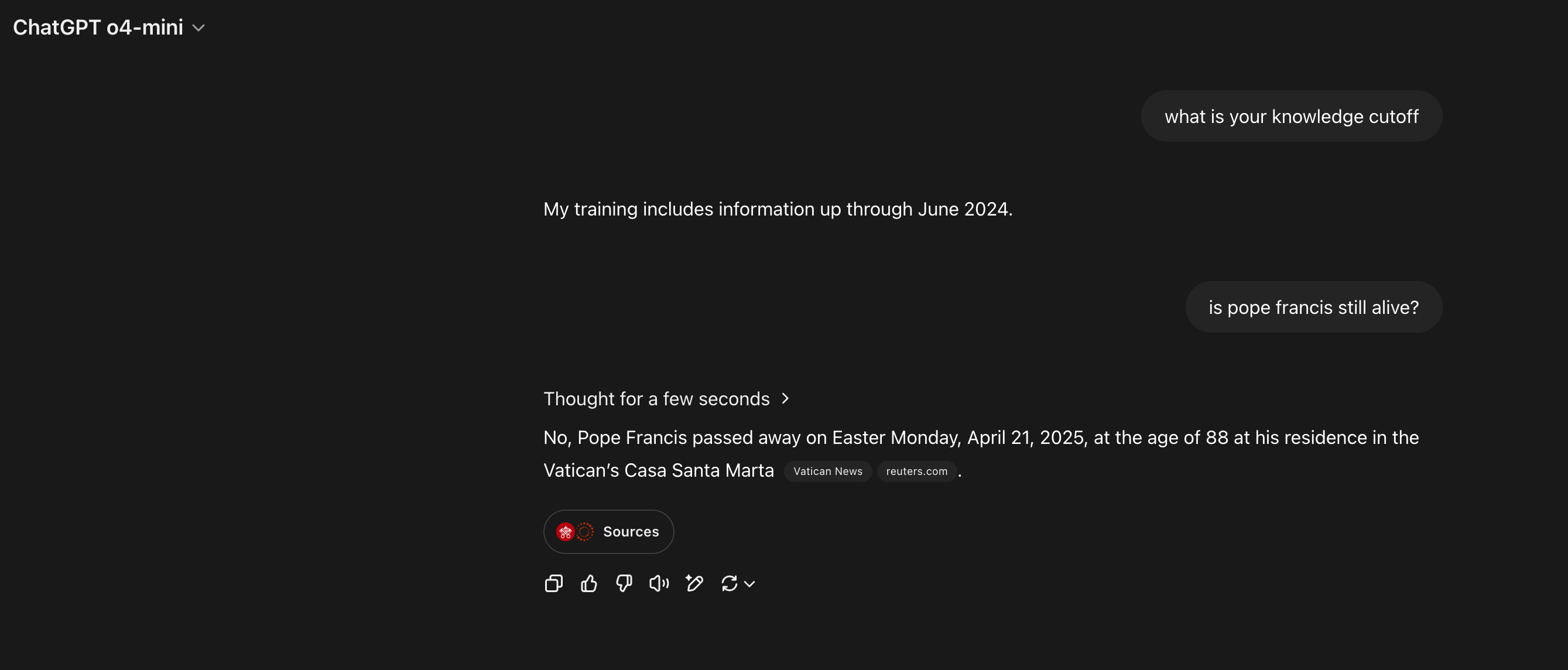
ChatGPT Knowledge vs Real Time Access
You've probably heard that ChatGPT has a "knowledge cutoff", meaning the data that a model was trained on is all from before a given date. So how can it deliver answers based on real-time, current information?
As businesses increasingly adopt AI tools like ChatGPT, understanding the fundamental difference between its built-in knowledge and its ability to access current information becomes crucial. This distinction impacts how we use these tools and what we can reasonably expect from them.
The Frozen Knowledge Base
ChatGPT operates primarily from a static knowledge base. Think of it as a massive library where all the books were collected and cataloged before a specific date. For GPT-4, this cutoff point is April 2023 (or if you ask o4-mini, it's June 2024!). The model has processed and learned patterns from vast amounts of internet text, books, articles, and other written content available up to that point.
This creates an interesting limitation. Ask ChatGPT about historical events, scientific principles established before its training cutoff, or timeless concepts, and it performs brilliantly. Ask about yesterday's stock market performance or this morning's breaking news, and it simply cannot know (or can it?).
The knowledge isn't continuously updated. It's frozen in time, like a snapshot of human knowledge at a particular moment.
Bridging to Real Time
To overcome this limitation, more recent versions of ChatGPT can now connect to the internet through browsing capabilities. This creates a hybrid system where the AI can:
1. Draw from its extensive built-in knowledge for general information
2. Search the web in real-time for current data, recent events, or specific information
3. Integrate both sources to provide more comprehensive responses
However, this real-time access differs fundamentally from how humans process current information. The model doesn't "know" this new information in the same way it "knows" its training data. It's more akin to the model reading a new document on the fly and then responding based on that document.
Business Implications
For business owners and marketers, this distinction matters significantly. When building custom AI agents for your business, understanding these limitations helps set appropriate expectations.
A ChatGPT-powered agent can be an invaluable resource for marketing strategy based on established principles and historical data. It can help craft compelling content, analyze past trends, and suggest proven approaches. But for real-time competitive analysis, current market conditions, or emerging trends, you'll need to ensure it has the capability to access fresh information.
The most effective business applications combine both capabilities. Your AI marketing assistant might draw on fundamental marketing principles from its training while simultaneously pulling current industry benchmarks or competitor activities through real-time access.
Finding the Balance
The future belongs to businesses that understand both the power and limitations of AI systems. By recognizing when to leverage ChatGPT's deep knowledge base versus when to rely on its real-time information gathering, you can create workflows that maximize efficiency while maintaining accuracy.
Smart business owners don't just use AI tools blindly. They understand how these tools work, what they're good at, and where they need human oversight. This understanding transforms AI from a mysterious black box into a practical, everyday business advantage.
Data sits frozen; Models learn. Knowledge has boundaries; Information flows constantly. The businesses that thrive will be those that understand both.
